When most people think about walking holidays in Scotland, their minds jump to the long days of summer. But those who know the Highlands well will tell you a secret: autumn might just be the best season of all to explore the Cairngorms.
From fiery forests to wildlife spectacles, autumn offers something truly special — and with fewer visitors around, you’ll often feel like you’ve got the mountains to yourself.
The Cairngorms are home to the largest area of ancient Caledonian pine forest left in the country. In autumn, the mix of Scots pine, rowan, birch and aspen creates a patchwork of reds, golds and greens that’s simply breathtaking.
Loch an Eilein, with its ruined island castle, is surrounded by woodland that glows at this time of year.
Glen Feshie becomes a tapestry of colour and light, perfect for both keen photographers and casual walkers.
On a guided autumn walk with us, you’ll discover the quieter corners where the colours shine brightest.
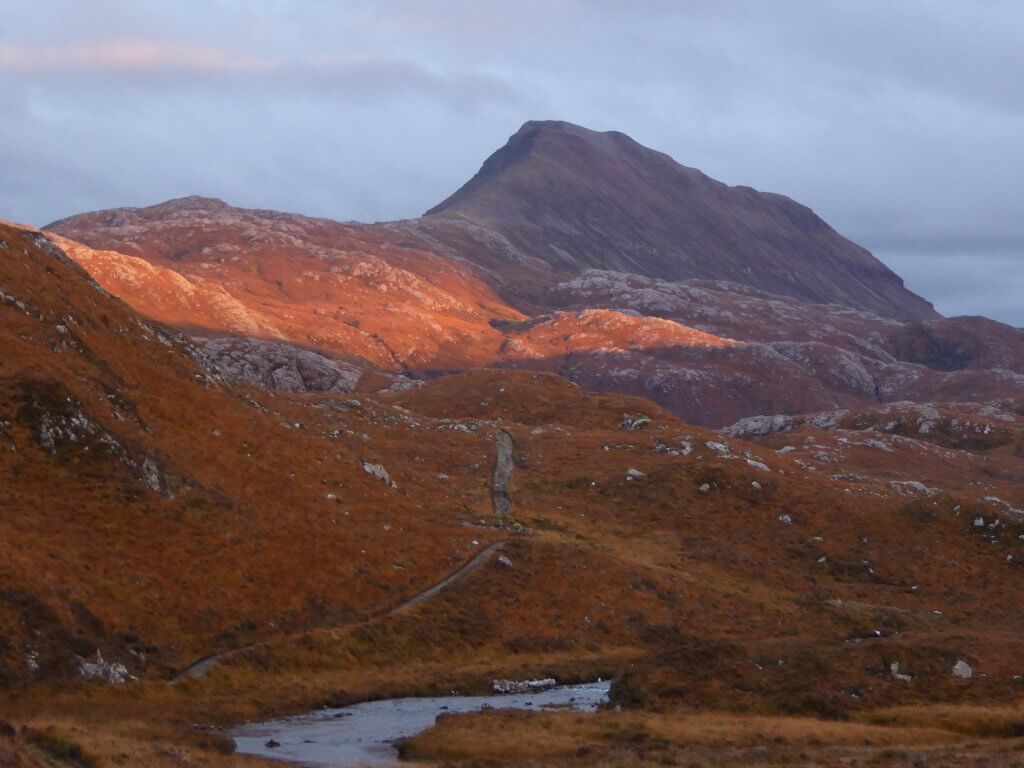
Autumn light and hills in Assynt
Autumn is one of the best times of year for wildlife spotting in the Cairngorms:
Red deer rut: listen out for the eerie, echoing roars of stags as they battle for dominance.
Red squirrels: busy preparing for winter, they’re much easier to spot among the thinning leaves.
Birdlife: autumn migrations bring the chance to see unusual species passing through.
Our guides know the best places to quietly observe these moments, without disturbing the animals.
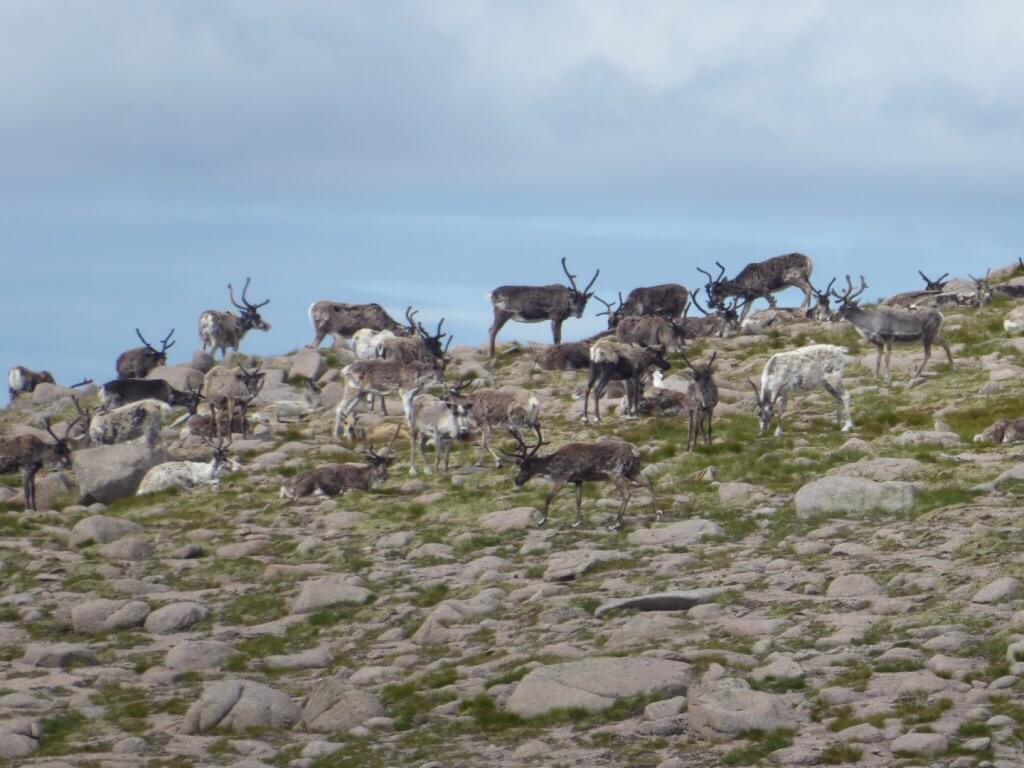
It’s always possible that you’ll bump into the Cairngorm reindeer herd when you’re out hiking in the Cairngorms
With summer heat gone, autumn walking is refreshingly comfortable. The air is crisp and cool, often delivering crystal-clear views across the Cairngorm plateau and surrounding glens. On the best days, you’ll feel as though you can see for miles — from the Monadhliath hills to the peaks of Lochnagar, and even through to Ben Nevis.
And unlike summer, you’ll encounter very few, if any, midges! This year (2025) has been particularly dry so we haven’t seen many midges locally at all.
By autumn, the school holiday crowds have disappeared. Trails that are busy in July and August are quiet again, letting you enjoy the true tranquillity of the Highlands.
Fraoch Lodge, our base here in Boat of Garten, is perfectly placed for peaceful evenings too. After a day on the hill, you can settle in by the fire with a home-cooked meal and a glass of wine, swapping stories with fellow walkers.
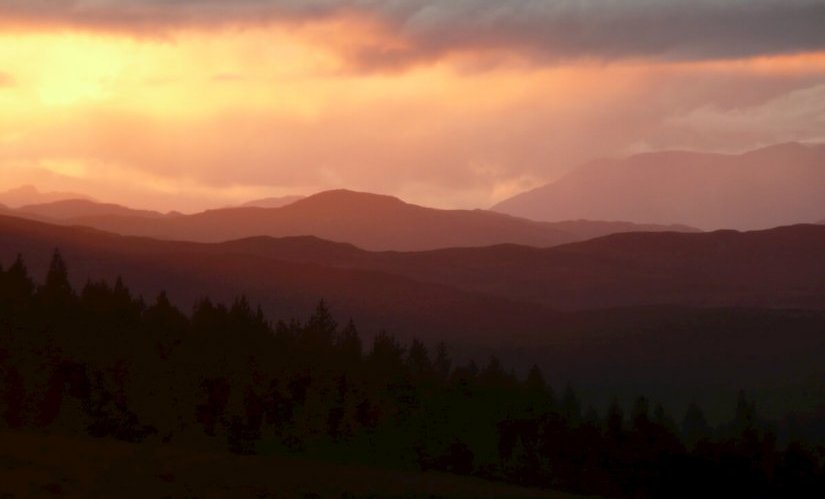
Autumn Sunset in the Cairngorms
With autumn offering a mix of golden days and early hints of winter, it’s the ideal season for a short, rejuvenating break. Our Autumn Walking Holidays are designed to make the most of this quieter, more colourful time of year, with routes chosen daily to match the conditions and the group.
Autumn in the Cairngorms is short but unforgettable. Join us for a guided walking holiday and see why so many of our guests return year after year to experience Scotland’s wild beauty at this magical time.
Explore our Autumn Walking Holidays
Check Availability at Fraoch Lodge
There’s something undeniably appealing about the freedom of heading into the hills on your own or with a trusted walking partner. But when it comes to hiking in the Scottish Highlands—a land shaped by myth, weather, and wilderness—going guided can offer so much more than just ease and safety. It can deepen your connection to the place, the people, and the purpose of your walk.
As The Telegraph recently put it:
“Sometimes, hell isn’t other people… when it comes to travel, joining up with a select bunch of our fellow humans on a guided holiday can have a heap of benefits, from cheaper prices and easier logistics to an added sense of safety, guaranteed camaraderie and the simple joy of recounting shared experiences over the evening campfire or cocktail.”
We couldn’t agree more. And here in the Cairngorms, we’ve seen time and again how guided walking transforms not just the route, but the experience.
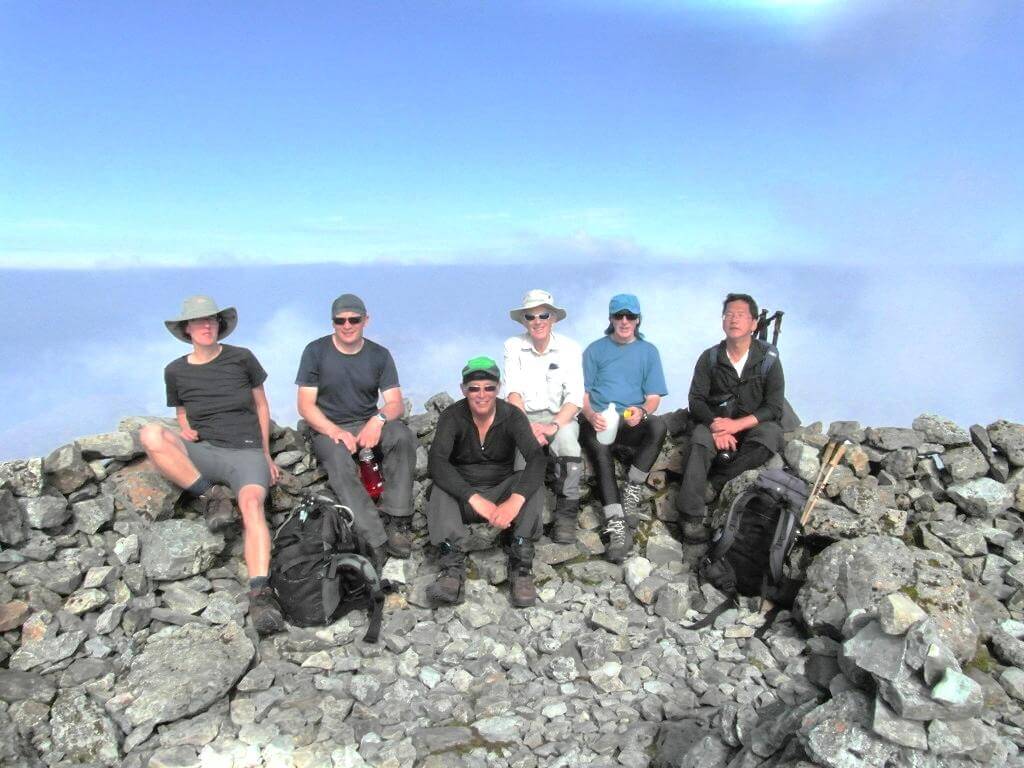
Here are five reasons to consider joining us on a guided hiking holiday in the Scottish Highlands:
Yes, solitude has its place—but there’s something incredibly enriching about exploring with others who share your sense of adventure. Our small groups attract walkers from all over the world, and by the end of the week, it’s not uncommon to see strangers become friends.
That evening whisky by the fire? It tastes better when you’ve laughed over the day’s blustery summit or compared wildlife sightings along the trail.
And forget the tired image of group tours. As The Telegraph wisely says:
“Group trips are the opposite [of corralled tourism]: exciting, extreme, pioneering; thought-provoking, lid-lifting, immersive; sociable, spectacular, unique.”
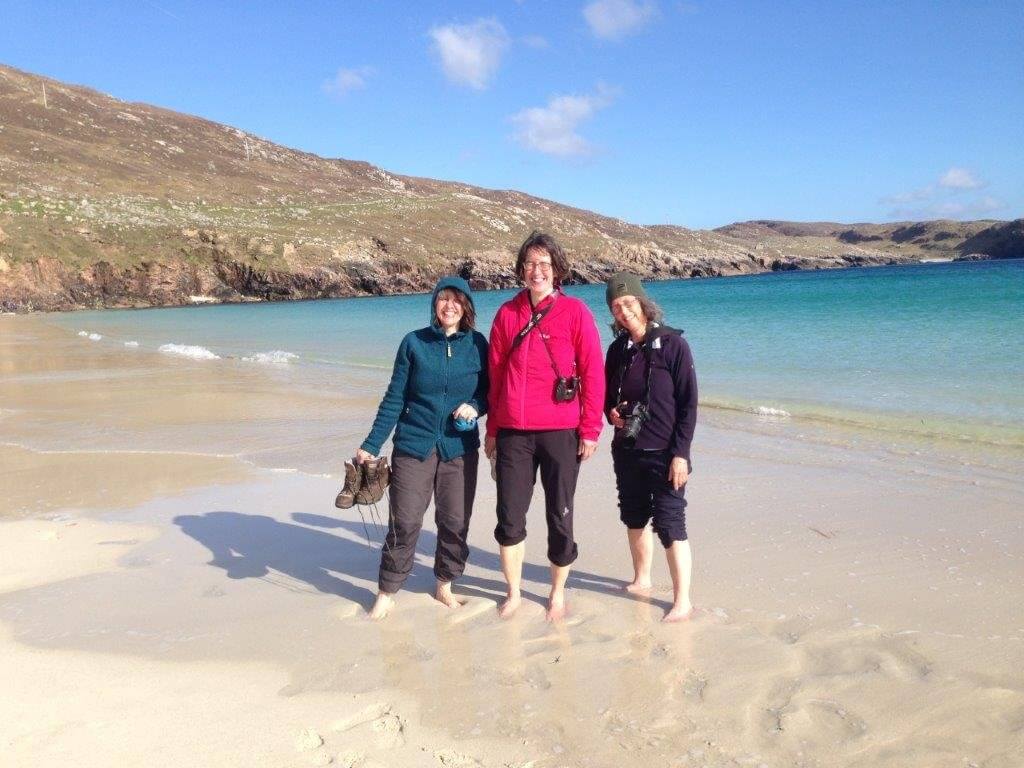
Paddling on the beach at Harris
Our guides have walked these hills in sunshine, sleet, and sideways snow. They don’t just know the routes—they know the history, the geology, the Gaelic place names, and the seasonal shifts in flora and fauna. That kind of insight turns a walk into a story, a summit into a memory.
You could read ten guidebooks and still miss the best parts. Or you could come with us and let the land come to life beneath your boots.
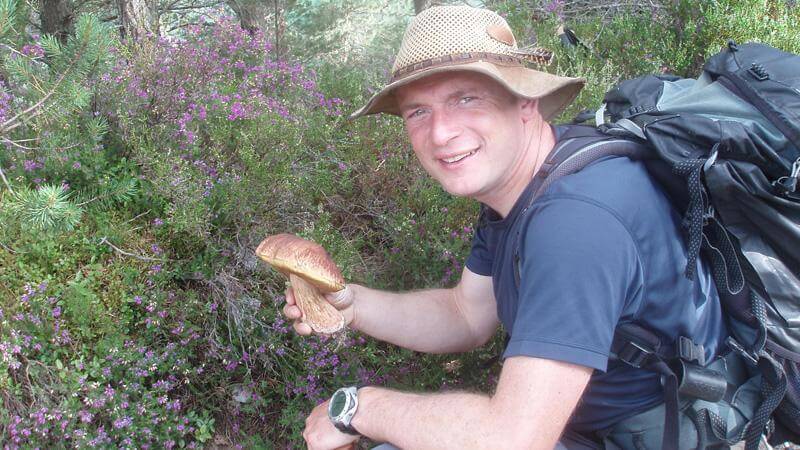
Your guide admiring the local flora.
From choosing the right trail for the weather, to knowing where the bogs are passable (and where they’re not), your guide takes care of the decisions that can otherwise dominate your day.
Instead of navigating or second-guessing your route, you can just walk, breathe, and absorb the views—secure in the knowledge that someone else is handling the logistics.
Scotland’s hills are beautiful, but they’re also wild. The weather can turn quickly, paths are often indistinct, and even experienced hikers can get caught out.
With a guide, you gain the confidence to go further and higher, knowing someone qualified and experienced has your back. You don’t have to worry about the map, the compass, or the emergency backup plan—we’ve got all that covered.
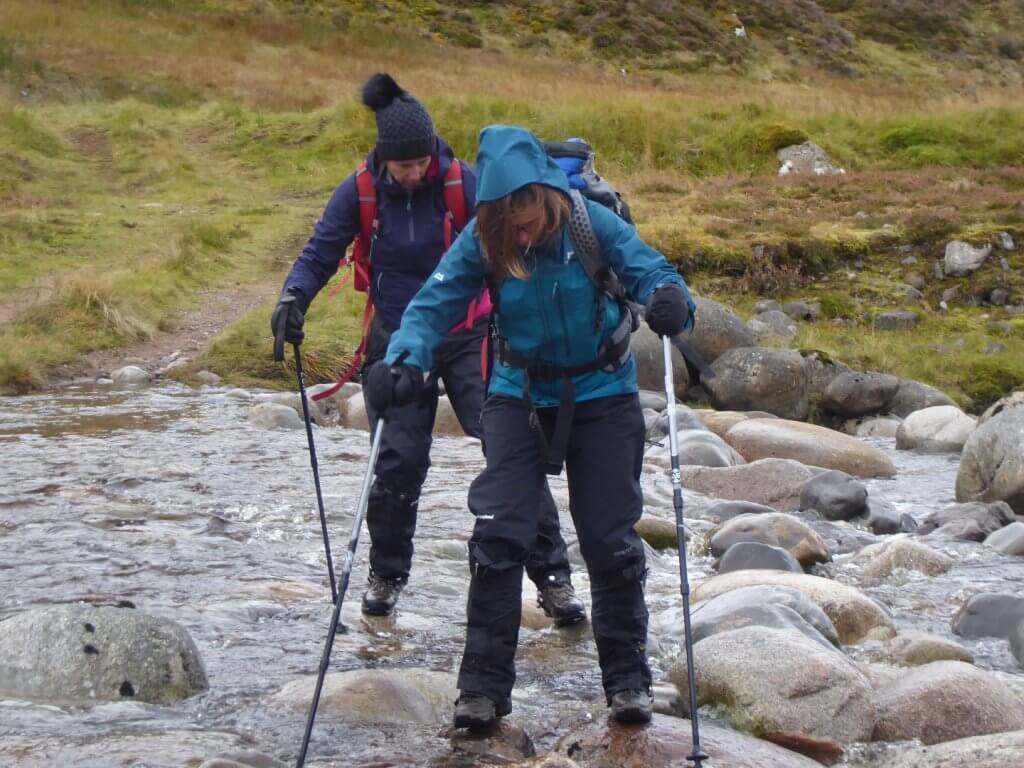
An under-rated hazard in the hills – river crossing. Have you ever struggled or turned back due to water levels?
Some routes just aren’t feasible to do solo—whether it’s due to complex navigation, remote location, or seasonal hazards. A guided trip can open up those less-trodden glens, off-the-beaten-path Munros, or even teach you the winter skills needed to tackle snow-covered ridges.
And because we’re based in the Cairngorms, we know the quiet corners and hidden treasures few visitors ever find.
Guided walking in the Highlands isn’t about being herded from viewpoint to viewpoint. It’s about connection—to place, to people, and to purpose. With our deep local knowledge, warm hospitality at Fraoch Lodge, and carefully curated itineraries, we offer more than just hikes. We offer immersive Highland experiences.
Whether you’re walking solo for the first time or looking to deepen your love of the hills, let us take you beyond the guidebooks. One guided step at a time.
Explore our upcoming trips or get in touch for a chat—we’d love to help you find the right path.
Winter in the hills can be a magical time – crisp air, snow-dusted peaks, and quiet trails, but it also requires a special kind of fitness to make the most of it. But it also brings its own challenges. Shorter days, colder weather, and potentially tougher underfoot conditions all mean that a good level of fitness is essential if you want to enjoy your days out safely and comfortably. The good news is that preparing doesn’t have to be complicated. With the right approach, you can build the stamina, strength, and resilience you need before winter arrives.
Walking in winter conditions can feel very different to the same routes in summer. Snow and ice underfoot mean your muscles work harder to stay balanced. Heavy layers, extra kit, and winter boots add to the load. Even a simple outing can burn far more energy than you might expect. Being physically prepared helps you to cope with these demands and ensures you still have the reserves to appreciate the beauty of your surroundings.
The best way to get ready for winter walking is to build a solid base of cardiovascular fitness. Aim for steady, regular activity that raises your heart rate without leaving you gasping. Brisk walking, cycling, or swimming are all excellent options. Consistency matters more than intensity: two or three sessions a week over a couple of months will make a noticeable difference when you hit the trails.
If possible, incorporate walking on hills or stairs into your routine. Uphill walking strengthens the muscles you’ll rely on most, and it also mimics the sort of steady effort needed on the hill.
Winter conditions put particular strain on your legs and core, so it pays to include some simple strengthening exercises. Squats, step-ups, and lunges build leg power, while planks or seated leg lifts help stabilise your core. You don’t need a gym – bodyweight exercises at home can be enough. A strong core improves balance on uneven ground and helps reduce the risk of falls.
Don’t overlook your upper body. Carrying a heavier pack in winter can be tiring on your shoulders and back. Press-ups, rows with resistance bands, or even light weight training can make a difference.
Ice, snow, and hidden rocks all test your balance. Try including some balance exercises, such as standing on one leg while brushing your teeth, or yoga-style stretches. Improved balance reduces fatigue and boosts confidence when moving across tricky ground. Flexibility, particularly in your hips and ankles, also helps keep your stride natural and reduces stiffness after a long day.
Longer outings are the best training for longer outings. If you can, get out on weekend walks that gradually increase in distance and height gain. These not only prepare your muscles and lungs, but also accustom your body to carrying a rucksack, using poles, and walking for several hours at a steady pace.
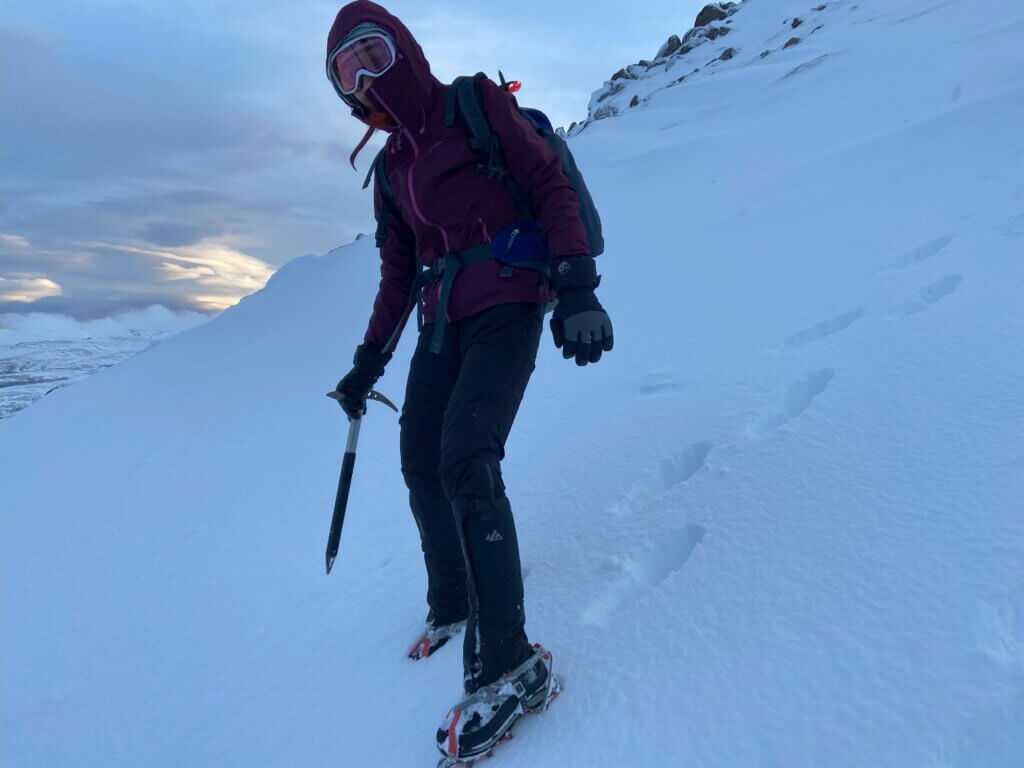
Ice Axe out! Time for some safety skills – New Year Winter Walking 2022 – 2023
Fitness is only part of the picture. Being comfortable outdoors in cooler, darker conditions matters just as much. Use the autumn months to walk in varied weather, get used to layers, and practise with winter kit such as poles, gaiters, or a heavier pack. Mental resilience is often what keeps you moving when conditions are less than perfect.
Start your preparation early and build up steadily. A sudden burst of training in the weeks before a trip is more likely to lead to injury than fitness. Instead, focus on creating a routine that feels achievable and sustainable. This way, when winter arrives, you’ll have the strength and stamina to enjoy it fully.
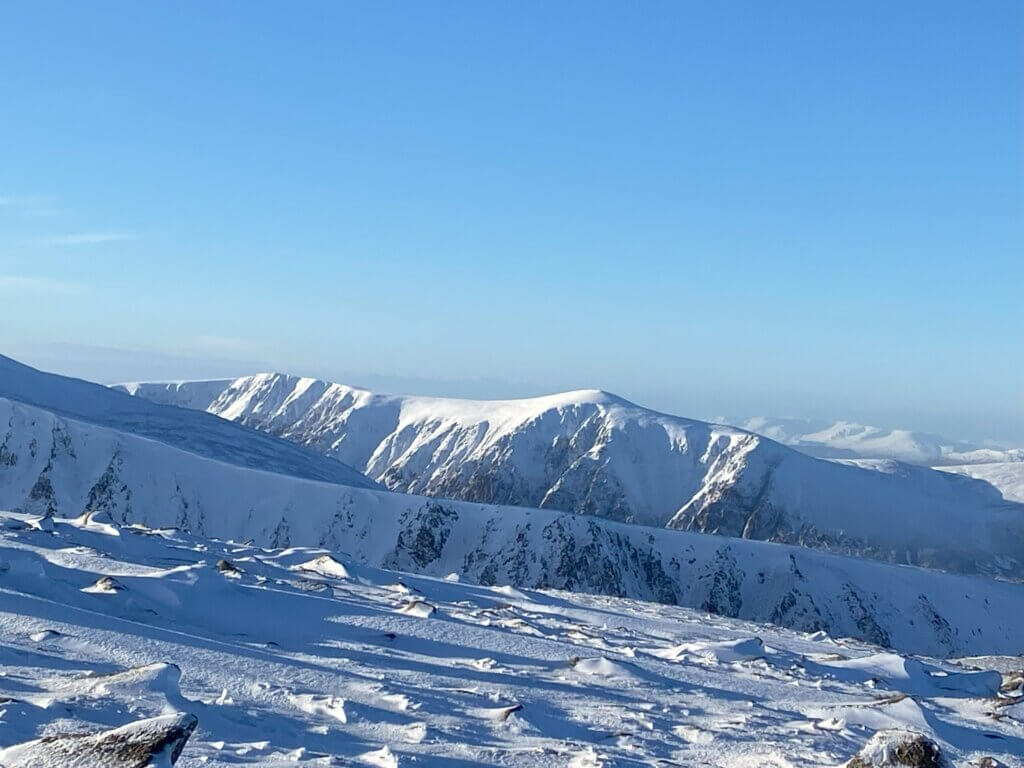
Can’t beat these views! New Year Winter Walking 2022 – 2023
Here in the Cairngorms, winter transforms the landscape into something truly spectacular. With the right preparation, you’ll not only cope with the conditions but relish the experience. Whether you’re heading out for a guided winter walk, joining a winter skills course, or simply exploring the snow-covered trails, a bit of pre-season training will reward you with more energy, more confidence, and more time to enjoy the wilderness.
For more tips and ideas of how to prepare keep an eye on our social channels
Summer might be the busiest time for visitors to the Highlands, but autumn has plenty to offer walkers. The days may be shorter, yet the season brings quieter trails, comfortable walking conditions, and a landscape that changes week by week.
Autumn is a season of constant change. Early in September the heather still gives a purple tinge to the hillsides, while birch, rowan and bracken gradually shift through yellows, oranges and browns. By late October, the larches have turned golden before dropping their needles. Even if you walk familiar routes, you’ll notice something different each time.
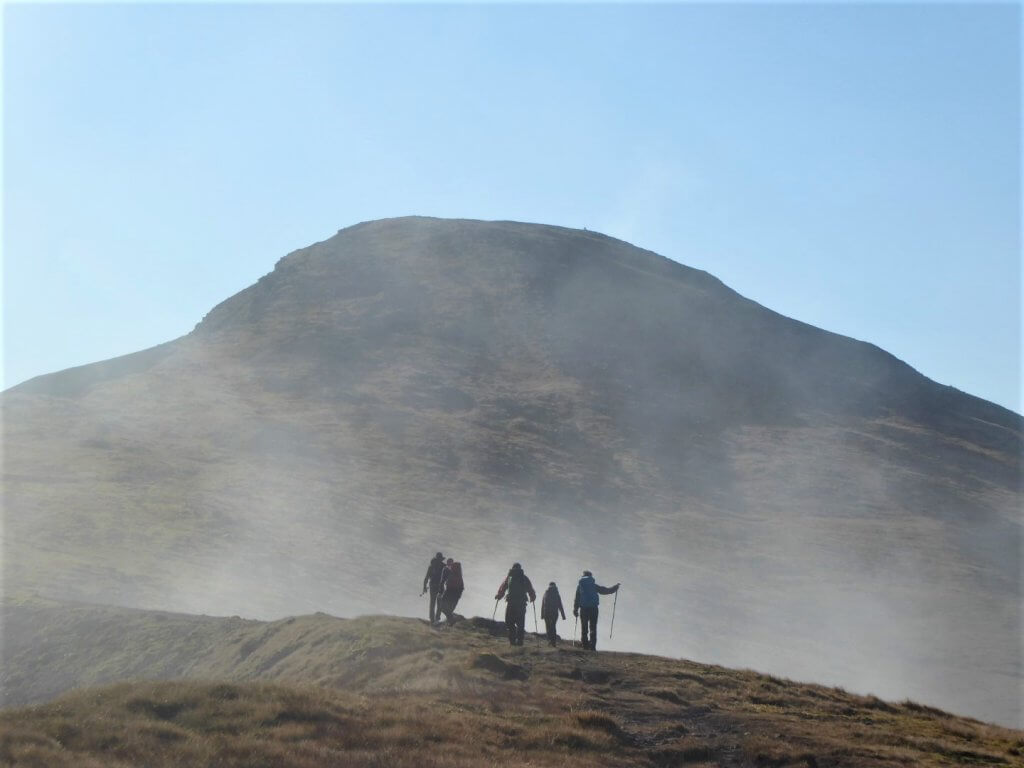
Low level cloud adding atmosphere to Autumn Munro bagging
It’s also a busy season for wildlife. Red deer stags are at their most visible and vocal during the rut, while mountain hares and ptarmigan begin to show signs of their winter coats. Migrating geese gather along the coasts, filling the skies with sound. If you enjoy spotting wildlife as much as walking, autumn is a rewarding time to be outdoors.
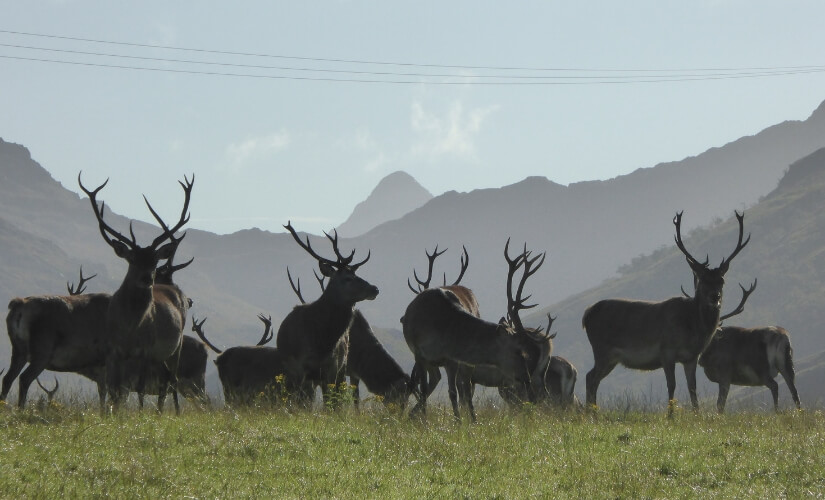
Many walkers find autumn weather easier than summer. The cooler air makes for more comfortable days on the hill, and with fewer midges around you can enjoy a lunch stop without too much distraction. The lower angle of the sun can make views especially clear, and if you’re out later in the afternoon you stand a good chance of catching a fine sunset.
With the main summer holiday period over, the Highlands feel more peaceful. Popular routes are noticeably less busy, giving you more space to enjoy the hills at your own pace. It’s an excellent time to take on well-known paths without the bustle that sometimes comes with them.
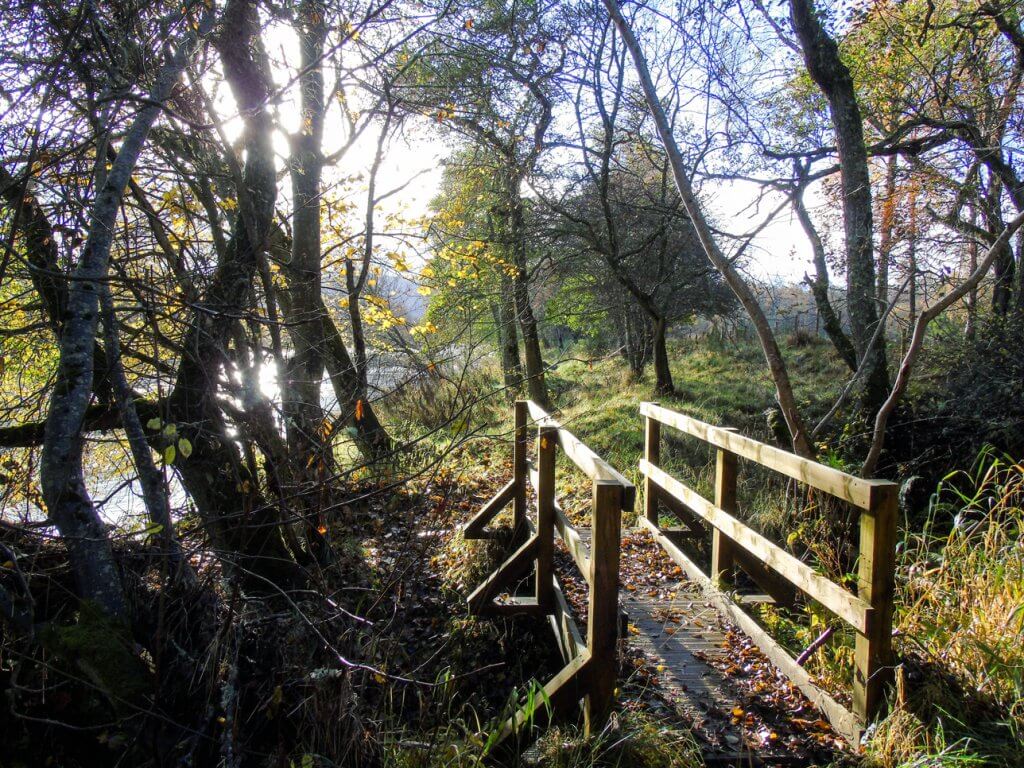
Autumn can also serve as a good stepping stone into winter walking. Shorter days and cooler conditions are a reminder that extra preparation is needed. Spending time outdoors now helps maintain your fitness and confidence so you’re ready for winter adventures when the snow arrives.
Autumn walking in the Cairngorms combines good conditions, varied scenery and quieter trails. Add in the chance to see wildlife at its most active, and it’s a season that rewards anyone who heads out. If you’re considering a walking trip before the end of the year, autumn is well worth your attention. Keep an eye on our socials for tips and offers in the autumn
All content © Copyright Scot Mountain Holidays 2025
Responsive web design by Summit Web Solutions